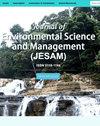巴基斯坦伊斯兰堡缓解空气污染树种预期性能指数评价
IF 0.3
4区 环境科学与生态学
Q4 ENVIRONMENTAL SCIENCES
引用次数: 7
摘要
由于城市化、工业化、人口增长和车辆数量的增加,城市的空气污染问题日益严重。植物在缓解城市空气污染方面可以发挥至关重要的作用。本研究旨在估计巴基斯坦首都伊斯兰堡沿路绿化带开发中使用的21种不同植物的空气污染耐受指数(APTI)和预期性能指数(API)。采用标准方法测定所选植物叶片提取物的抗坏血酸、总叶绿素含量、相对含水量和pH值,测定APTI和API。结果表明,紫杉树(Syzygium cumini L., jaman)、紫杉树(Pterospermum acerifolium, kanak champa)和雪桐(Alstonia scholaris, devil tree)表现较好。根据API和APTI值,这些物种可以有效地减少空气污染,并且可以有效地用于城市绿地的开发。小白、苦楝、山茱萸、黄檀、柽柳、金合欢、金合欢、金合欢对空气和噪音的抑制效果都很差。这些植物表现很差,对空气污染非常敏感。这些植物可以作为城市空气质量差的生物指标。本文章由计算机程序翻译,如有差异,请以英文原文为准。
Evaluation of Anticipated Performance Index of Tree Species for Air Pollution Mitigation in Islamabad, Pakistan
There is ever increasing problem of air pollution in cities due to urbanization, industrialization, population growth and increased number of vehicles. Plants can play a vital role in mitigation of air pollution in urban areas. The present study was conducted to estimate the Air Pollution Tolerance Index (APTI) and Anticipated Performance Index (API) for 21 different plant species used for green belt development along the roadsides in Islamabad, the capital city of Pakistan. For APTI and API estimation, ascorbic acid, total chlorophyll content, relative water content and pH of leaf extract of selected plant species were measured using standard methods. The results showed that Syzygium cumini L. (jaman), Pterospermum acerifolium (kanak champa) and Alstonia scholaris (devil tree) were the excellent performers. According to API and APTI values, these species were found effective in reducing air pollution and could be effective for green belt development in urban areas. Albezia lebbeck, Melia azedarach, Eucliptus camaldulensis, Dalbergia sissoo, Tamarindus indica, Acacia nilotica L., Callistemon viminalis and Leucaena leucocephala are very poor performers regarding air and noise abatement. These plants are very poor performers and are very sensitive plants to air pollution. These plants can be used as bio-indicators of poor urban air quality.
求助全文
通过发布文献求助,成功后即可免费获取论文全文。
去求助
来源期刊

Journal of Environmental Science and Management
ENVIRONMENTAL SCIENCES-
CiteScore
0.90
自引率
0.00%
发文量
10
审稿时长
2 months
期刊介绍:
The Journal of Environmental Science and Management (JESAM) is an international scientific journal produced semi-annually by the University of the Philippines Los Baños (UPLB).
JESAM gives particular premium to manuscript submissions that employ integrated methods resulting to analyses that provide new insights in environmental science, particularly in the areas of:
environmental planning and management;
protected areas development, planning, and management;
community-based resources management;
environmental chemistry and toxicology;
environmental restoration;
social theory and environment; and
environmental security and management.
 求助内容:
求助内容: 应助结果提醒方式:
应助结果提醒方式:


